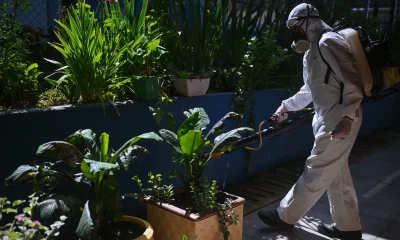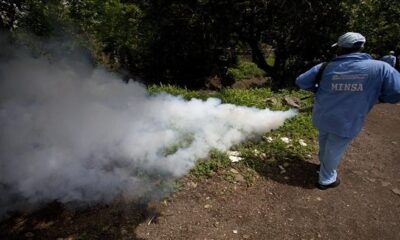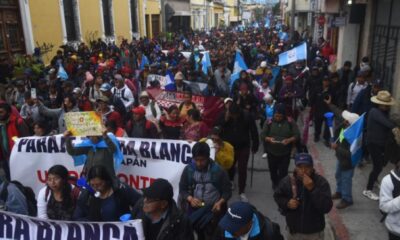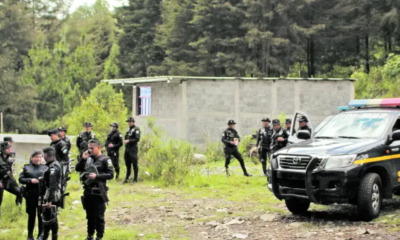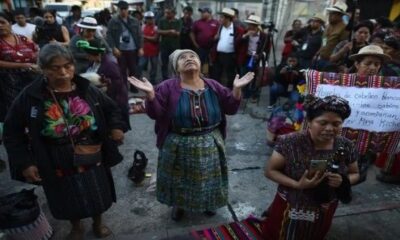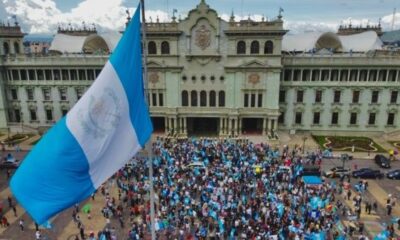Central America
Threats from the migratory route in Guatemala: dengue, arrests and climate change
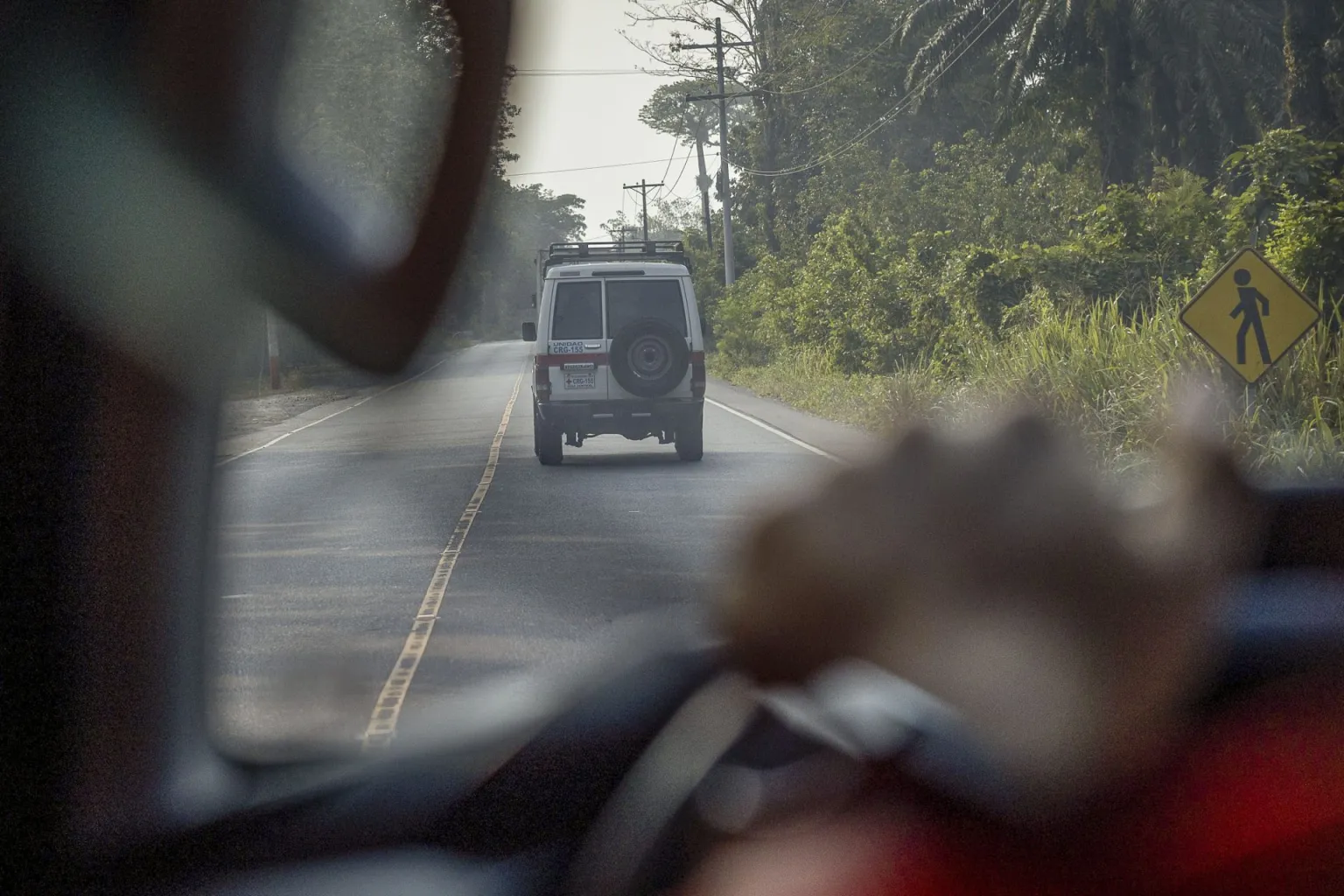
Thousands of migrants cross the border between Honduras and Guatemala daily on their way to the United States, facing the threat of tropical diseases such as dengue, the arrest of security forces and their subsequent deportation or the impact of a route hit by climate change.
On the border of El Corinto, between Guatemala and Honduras, the country’s Red Cross serves migrants who need medical assistance.
“Our job is to alleviate the suffering a little and dignify the lives of people who are in transit,” explains to EFE Mariana Bonilla, who works with the Red Cross at the Care Center for Migrants and Refugees (CAPMIR), located on the Guatemalan side of the border.
Every morning, Bonilla, 31, and the rest of her team, track the border road surrounded by African palm, banana plantations and the imposing Motagua River, the largest in Guatemala, in search of groups of migrants to guide them and indicate the points where they can receive support.
Within its center of attention, supported by the International Federation of Red Cross and Red Crescent Societies (IFRC), migrants receive both medical and psychosocial assistance. “Many come with traumas from their passage through the Darién jungle” between Colombia and Panama, explains Bonilla.
Two kilometers after crossing the border, on the migratory route, is the village of Jimeritos, a community made up of farmers dedicated mainly to the cultivation of bananas that for six years has turned its small communal room into a refuge for migrants to rest.
“We are motivated to work with migrants. They leave their countries to seek an improvement for their family and here we give them what we can, because we do not know when we will have the same need,” explains Felicita Palencia, a resident of Jimeritos who was trained by the Red Cross to take care of migrants.
The community lounge has a bedroom with capacity for 12 people and, according to the leaders of the village, there are nights where they receive up to 30 migrants who seek refuge before continuing their journey to the Mexican border of Tecún Umán, located about 540 kilometers at the other end of the country.
Community community members pay attention despite the difficulties they are going through, such as strong dengue epidemics that affect the department of Izabal, where in 2023 more than 500 cases were registered and the region was put on red alert by the health authorities, a disease from which migrants are not freed either.
On May 2, in the community room, the Red Cross gathered the children of the Jimeritos public primary school to give them a talk about hygiene and sanitation measures to eliminate the mosquito that transmits dengue, as well as tools to identify the symptoms of this disease.
Carlos Linares, who has lived in this migrant host village for 42 years, assures EFE that the biggest concern for them is climate change, since the rainy season is approaching and in years such as 2001 and 2020 many houses were destroyed by storms.
“This part of the road is the most difficult to get to the United States, because there are a lot of police and they can return us to Honduras,” Mario Alvarado, a Honduran migrant who decided to look for the “American dream,” explains to EFE.
With temperatures of 40 degrees, Alvarado crossed the border, bordering the Motagua River and the African palm plantations, to end up arrested by the Guatemalan authorities.
Alvarado is the third time he has been on his way to the United States. He does it with his compatriot Danny Gámez, the same one with whom a few months ago they were deported from Texas, United States, after a journey that allowed them to work in the North American nation as painters.
Like Alvarado and Gámez, thousands of migrants seek to cross Guatemala every year and so far in 2024 alone, almost 8,000 have been arrested by the security forces for their subsequent deportation, according to figures from the Guatemalan Migration Institute (IGM).
“It doesn’t matter how many times we are deported. If there are no conditions to live in Honduras, we will always find a way to leave again,” Alvarado reiterates, before moving away between the path of a plantation with his journey companion.
Central America
Panama seizes over three tons of drugs hidden in Caribbean port container
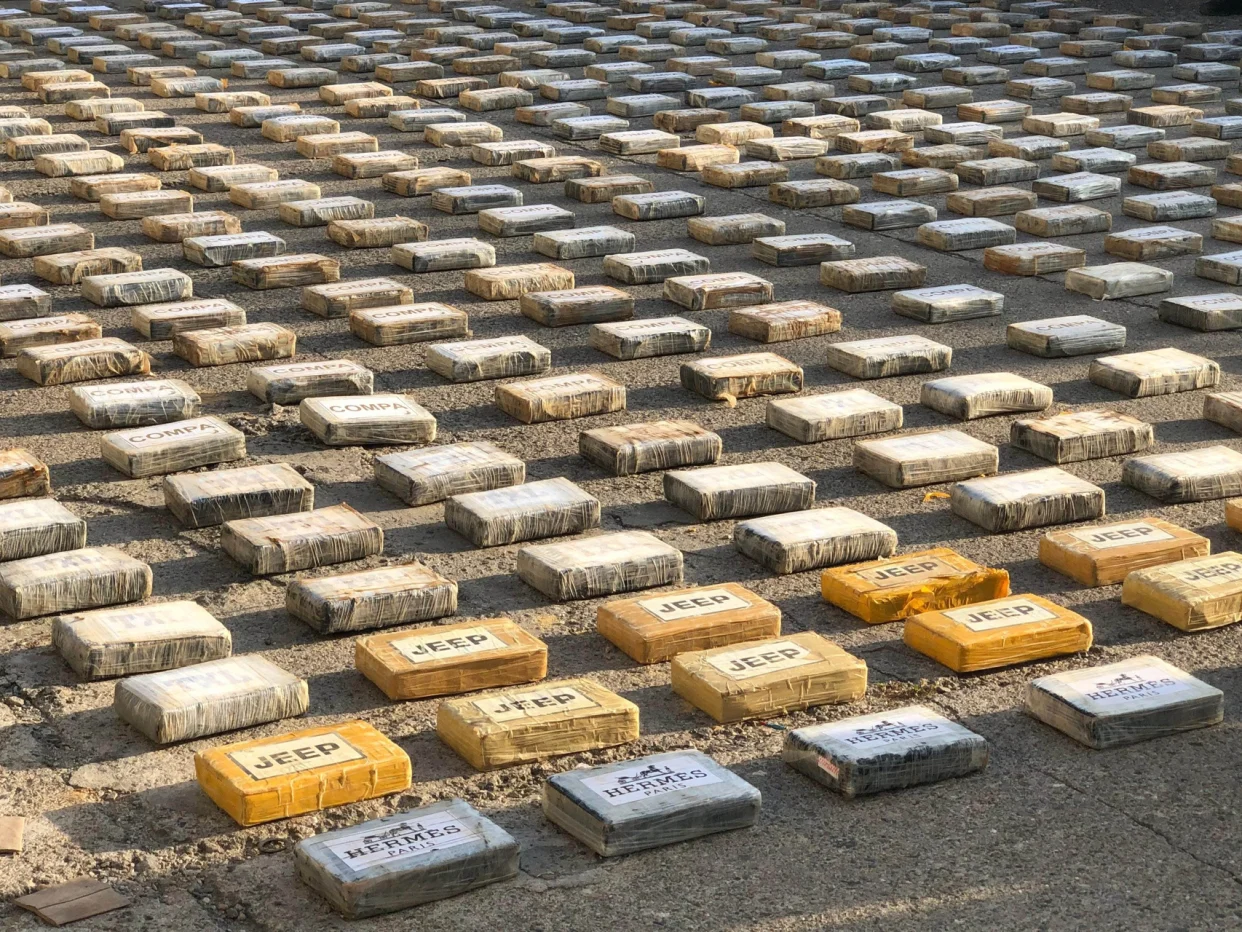
Panama’s National Air and Naval Service (Senan) reported on Sunday the seizure of more than three metric tons of drugs that were concealed inside a shipping container at a port terminal on the country’s Caribbean coast.
According to a statement posted on X, Panamanian aeronaval authorities confirmed the confiscation of 3,205 packages of a suspected illicit substance hidden inside a container in transit through Panama, at a port facility in the Caribbean province of Colón. Each package typically weighs approximately one kilogram.
Earlier this week, Senan agents also seized an additional 2.2 metric tons of drugs and arrested five individuals, including a Colombian national, in separate operations linked to drug trafficking activities.
Panama serves as a major transit route for drugs produced in South America and destined mainly for the United States — the world’s largest consumer of cocaine — and Europe. According to official figures, Panamanian authorities seized approximately 80 metric tons of illicit substances in 2024.
Central America
Honduras election crisis deepens as CNE president denounces intimidation attempts

Tegucigalpa remains engulfed in a deep post-electoral crisis, marked by the absence of final results from the general elections held on November 30. On Thursday, the presiding counselor of the National Electoral Council (CNE), Ana Paola Hall, publicly denounced acts of intimidation that she warned could jeopardize the final phase of the process.
Following a meeting with the G-16+ diplomatic corps, Hall expressed concern over two specific incidents: a call by former president Manuel Zelaya summoning supporters of the Libre Party to gather outside the INFOP facilities—where electoral records and materials are being safeguarded—and a statement issued by the Permanent Commission of Congress accusing her and counselor Cossette López of alleged electoral crimes, an action she described as “baseless and outside their jurisdiction.”
Hall reaffirmed her institutional commitment and warned that she will not allow interference in the announcement of the results. “Honduras comes first,” she emphasized, underscoring her intention to defend the electoral process as a cornerstone of democracy.
Meanwhile, the preliminary results place Nasry ‘Tito’ Asfura, candidate of the National Party, in the lead with 40.52%of the vote, followed closely by Salvador Nasralla of the Liberal Party, with 39.48%. The ruling party’s candidate, Rixi Moncada of Libre, is in third place with 19.29%. Around 0.6% of the tally sheets—many of them showing inconsistencies—have yet to be reviewed.
The Organization of American States (OAS) called an extraordinary session of its Permanent Council to analyze the situation, while civil organizations and governments such as Paraguay’s urged respect for the popular will.
Honduran President Xiomara Castro accused the United States, and specifically former president Donald Trump, of obstructing the process, while also denouncing threats from gangs against voters aligned with her party.
Central America
OAS and EU urge honduran political actors to respect vote results and avoid unrest

The Electoral Observation Missions of the Organization of American States (OAS/EOM) and the European Union (EU EOM) issued an urgent call on Wednesday urging political actors in Honduras to respect the will expressed at the polls on November 30 and to refrain from inciting public disorder while the vote count is being finalized.
Both missions called on candidates, political parties, and authorities to act responsibly and maintain “active vigilance” over the vote-counting process.
So far, the National Electoral Council (CNE) has processed 99.4% of the tally sheets, but 2,773 still show inconsistencies, representing more than 500,000 unverified votes. The electoral body has not set a date for the special review, though it could begin later this week.
“The OAS/EOM reminds that electoral authorities are the only ones empowered to validate the results and reiterates its rejection of any call to disrupt public order,” the mission said in an official statement.
-

 International4 days ago
International4 days agoWashington declares State of Emergency as atmospheric river brings severe flooding
-

 International4 days ago
International4 days agoU.S. to require five-year social media history from tourists under Visa Waiver Program
-

 International3 days ago
International3 days agoCuba battles out-of-control dengue and chikungunya epidemic as death toll rises to 44
-

 Central America3 days ago
Central America3 days agoHonduras election crisis deepens as CNE president denounces intimidation attempts
-

 Central America4 days ago
Central America4 days agoOAS and EU urge honduran political actors to respect vote results and avoid unrest
-

 International3 days ago
International3 days agoColombia says it would not reject Maduro asylum request as regional tensions escalate
-

 International2 days ago
International2 days agoSeveral people shot in attack on Brown University campus
-

 International3 days ago
International3 days agoEcuador on track for record violence as homicides hit highest level in Latin America again
-

 International4 days ago
International4 days agoSix ecuadorian soldiers jailed pending trial for alleged extrajudicial execution
-

 International2 days ago
International2 days agoU.S. and Mexico Reach Deal to Address Water Deficit Under 1944 Treaty
-

 Central America11 hours ago
Central America11 hours agoPanama seizes over three tons of drugs hidden in Caribbean port container



























































